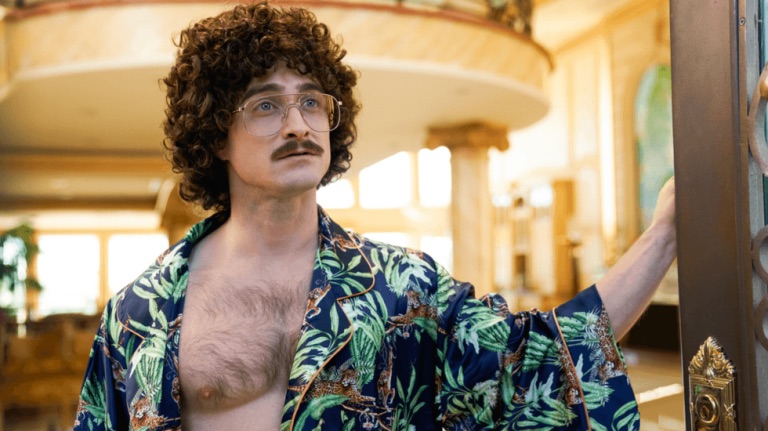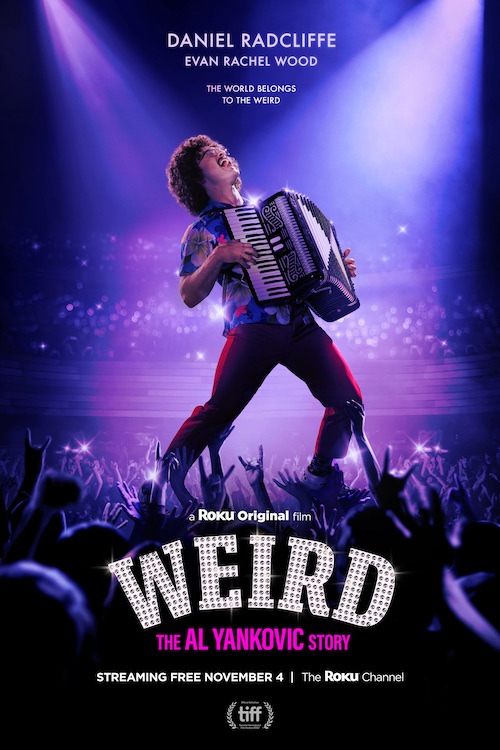Fifteen years after Walk Hard (2007) decimated the biopic, along comes Weird: The Al Yankovic Story to spit on the ashes. True to its subject matter, the film is a pitch-perfect and often very funny parody of a subgenre known for taking itself far too seriously, which seems fitting for a subject who built a career on taking rock stars down a peg.
Daniel Radcliffe stars as Yankovic, who we meet as a young man aspiring to nothing less than to become “the best-known accordion player in an extremely specific genre,” namely song parodies. Long before he’s christened “Weird Al” by Doctor Demento (Rainn Wilson), Yankovic’s life is a struggle, growing up under the thumb of two parents (Julianne Nicholson and Toby Huss) who forbid any playing of the squeezebox in their home, encourage him to “stop being who you are and doing what you love,” and tell him his future belongs in “the factory.”
But a chance encounter with an accordion salesman brings Al in touch with his destiny, which is further sealed when he attends an under-age polka party and leaves a superstar. It’s not long after that he’s shooting to the top of the charts with his parodies “My Bologna” and “I Love Rocky Road,” even as industry naysayers (particularly the Scotti Brothers, played by the real Yankovic and Will Forte) warn that he’ll never amount to anything. When the news reports on artists benefitting from the “Yankovic bump,” a scheming Madonna (Evan Rachel Wood) knocks on Weird Al’s mansion door, sending him out on a tortured path that embroils him in drugs and alcohol and eventually brings him face to face with cartel kingpin Pablo Escobar.
As should be obvious by now, Weird is a heavily fabricated look at Yankovic, who’s widely known as a straight-laced nice guy whose parents were supportive of his unusual creative pursuits. Working from a script co-written by Yankovic and director Eric Appel, the film puts bloated biopics like Bohemian Rhapsody in its sights and has a blast shredding the conventions of the genre. It’s at its funniest in the first half, when it digs into the absurdity of desiring a career focused on changing the words to popular songs. The montage of Weird Al’s creative breakthrough in writing “My Bologna,” a parody of The Knack’s “My Sharona,” is ridiculous, but really no less so than any other depiction of songwriting in these movies. A party at Demento’s home, in which Wolfman Jack challenges Al to come up with parody lyrics to Queen’s “Another One Bites the Dust” on the spot, is funny not only for the parade of outlandish cameos but for the seriousness with which it treats Yankovic’s very silly work.
The key to solid parodies is a commitment to the bit. Weird Al owes his incredible longevity to a dedication to creating parodies that don’t just replace song lyrics with references to food or pop culture; he makes songs that perfectly mimic the composition and energy of the originals. Likewise, Daniel Radcliffe, an admittedly head-scratching choice for this role, works as Weird Al because he’s smart enough to play the role as if he’s aiming for an Oscar. It’s a bonkers performance that requires the actor to act like writing “Eat It” is a work of rebellion and then pushes him into absurd places in the film’s latter half (it’s much more violent than you expect a Weird Al biopic to be), and Radcliffe shows an impressive commitment. It doesn’t matter that he doesn’t look or sound like Yankovic; that’s the joke. But he dons those Hawaiian shirts and wields the accordion with the same intensity that Rami Malek did as Freddie Mercury, and the result is often very funny.

Daniel Radcliffe in “Weird: The Al Yankovic Story.”
The rest of the cast also largely understands the assignment, particularly Toby Huss as Al’s disapproving father and Wood, who has the time of her life playing Madonna as a scheming, larger-than-life villain. Wilson is the broadest as Demento, which is probably fitting, but brings an endearing, fatherly tone to the relationship with his protégé, which pays off in one of the film’s funniest gags. They’re enabled by solid direction from Appel, who recreates the glossiness of Oscar-bait biopics instead of delivering another over-lit comedy; the aesthetic fidelity is another key component in selling the parody.
The film is a nearly two-hour extension of a Funny or Die sketch (also written and directed by Appel) from 12 years ago and, at times, the script struggles to extend its runtime. While many of the jokes are very funny, the film lags in its second act, and the sharp satire of the first hour gives way to broader humor as the movie nears its climax, although it should be noted that the film culminates in a wonderful gag. Yankovic’s surreal interests and flights of fancy give its own surreal personality, even if it never quite achieves the bonkers bliss of Yankovic’s other feature film attempt, UHF (1989). And Weird can’t escape the fact that Walk Hard beat it to the punch a decade-and-a-half earlier, and many of the jokes about overnight success, disapproving parents and purposefully ridiculous cameos are similar.
But if there’s room for more than one biopic, there’s certainly room for multiple parodies of biopics. Weird Al Yankovic has been a mainstay in the music industry for nearly five decades, and is deserving of his own moment in the spotlight. If it’s utterly untrue and makes fun of similar films – well, isn’t that the point? This is the Weird Al movie that Weird Al’s fans deserve.

| Producer: | Lia Buman, Mike Farah, Joe Farrell, Tim Headington, Whitney Hodack, Mike Silva, "Weird Al" Yankovic |
| Release Date: | November 4, 2022 |
| Running Time: | 108 minutes |
| Starring: | Daniel Radcliffe, Evan Rachel Wood, Rainn Wilson, Toby Huss, Julianne Nicholson, "Weird Al" Yankovic |
| User Rating: | |
| Writer: | Eric Appel and "Weird Al" Yankovic |
| MPAA Rating: | Not rated (contains some suggestive material and violence) |
| Director: | Eric Appel |
| Distributor: | The Roku Channel |

